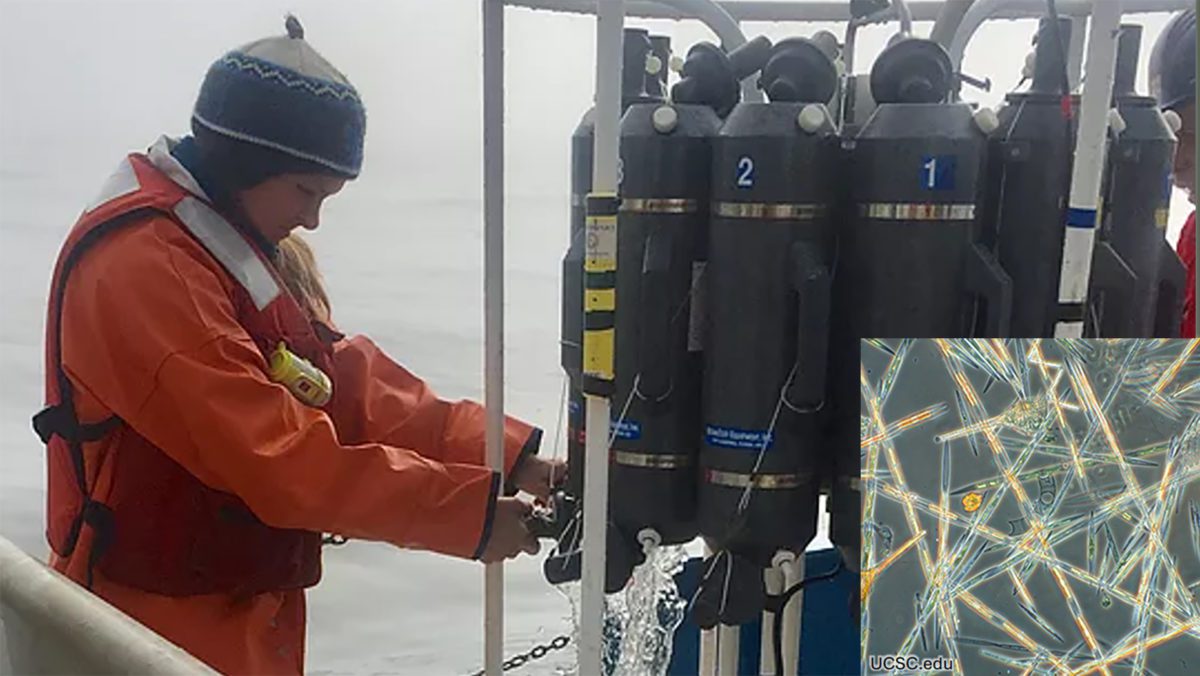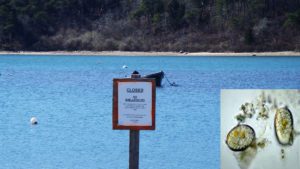Woods Hole Center for Oceans and Human Health Receives Additional Five Years of Funding
 MIT-WHOI Joint Program graduate student Suzi Clark collects water samples for the presence of Pseudo-nitzschia (inset), a genus of plankton that produces domoic acid, a neurotoxin that can lead to amnesic shellfish poisoning in humans. (Photo courtesy of Denis McGillicuddy ©Woods Hole Oceanographic Institution)
MIT-WHOI Joint Program graduate student Suzi Clark collects water samples for the presence of Pseudo-nitzschia (inset), a genus of plankton that produces domoic acid, a neurotoxin that can lead to amnesic shellfish poisoning in humans. (Photo courtesy of Denis McGillicuddy ©Woods Hole Oceanographic Institution) April 19, 2024
Interdisciplinary center at WHOI focuses on relationship between the ocean and public health with support from the National Institute of Environmental Health Sciences and the National Science Foundation
The National Institute of Environmental Health Sciences (NIEHS) and National Science Foundation (NSF) have announced that the Woods Hole Oceanographic Institution (WHOI) will receive funding to continue operating the Woods Hole Center for Oceans and Human Health (WHCOHH). The five-year, $7.5 million award is part of an inter-agency effort between NSF and NIEHS to foster collaborations among biomedical researchers, physical and oceanographic scientists, and community partners. This is the fifth time WHCOHH has received funding, resulting in 25 continuous years of investigating the intersections between the ocean, human health, and societal well-being.
"The connection among ocean pollution, climate change, and human health are problems that we are only beginning to understand," said Anika Dzierlenga, Ph.D., program lead at the NIEHS. “People rely on oceans and lakes for jobs, food, tourism, recreation. These centers will help bring researchers and community groups together to study and take action to protect public health in coastal regions and around the Great Lakes.”
“We’re excited to continue this long-standing partnership with NIEHS. Bringing geoscientists, health scientists, and community partners together to address these important questions has far-ranging impacts beyond what either agency can support alone,” said Henrietta Edmonds, Ph.D., a program manager in NSF’s Division of Ocean Sciences.

Posted "No Shellfishing" sign in Mill Pond, Orleans, MA. (Photo by Dave Kulis, ©Woods Hole Oceanographic Institution)
WHCOHH was established in 2004. Since that time, the Center has had a major focus on harmful algal blooms (HABs) and the many impacts of blooms on humans and society. Current research focuses on fundamental questions regarding the nature of HABs, climatic factors that influence bloom conditions, and toxicological processes that relate to human health concerns and is being led by WHOI Associate Scientists Michael Brosnahan, David Ralston, and Neel Aluru, with community engagement led by Senior Research Specialist Mindy Richlen. WHOI senior scientist Dennis McGillicuddy is the center’s director, succeeding John Stegeman, who has led the Center for the past 20 years.
“We are pleased to continue our efforts to understand the links between the ocean and human health,” said McGillicuddy. “We are very grateful to have the opportunity to work together with the other NIEHS/NSF centers to help provide the foundations for societal resilience in the face of a rapidly changing ocean.”
In addition to WHCOHH, the current round of funding by NIEHS and NSF will support five other centers aimed at improving public health by investigating the many ways oceanic processes affect humans and society. Together the two agencies plan to invest more than $42 million over five years for the centers program, continuing a two-decade long collaboration. NIEHS administers the centers at the National Institutes of Health (NIH) and supports individual research projects that focus on the ocean and the Great Lakes and their impact on human health.
###
The Woods Hole Oceanographic Institution is a private, non-profit organization on Cape Cod, Mass., dedicated to marine research, engineering, and higher education. Established in 1930 on a recommendation from the National Academy of Sciences, its primary mission is to understand the ocean and its interaction with the Earth as a whole, and to communicate a basic understanding of the ocean’s role in the changing global environment. For more information, please visit http://www.whoi.edu/.
